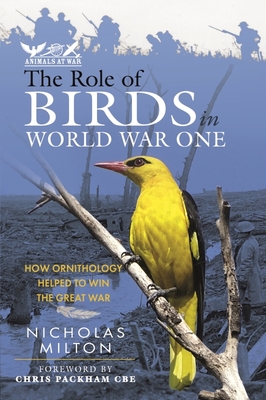The Role of Birds in World War One: How Ornithology Helped to Win the Great War

The Role of Birds in World War One: How Ornithology Helped to Win the Great War
The British Expeditionary Force sent to France in the late summer of 1914 has been referred to as 'The Best British Army Ever Sent to War' as it was one of the most highly trained and disciplined forces in the world. It was also the 'Best Birdwatching Army Ever Sent to War' for among its ranks were hundreds of both amateur and professional ornithologists. When not fighting many soldiers turned to birdwatching as a way of wiling away the long hours spent on guard duty or watching over 'no man's land'. As a result, the hobby ranked as one of the most popular past-times for soldiers at the front, on a par with smoking, writing, games, gambling, sport and shooting rats. The list of birds seen by soldiers serving in all the theaters of war was truly impressive ranging from the common like sparrows, skylarks and swallows to the exotic like golden orioles, hoopoes and bee-eaters.
It was not just at the battle front that birds found themselves in the firing line but also on the home front. Birds provided inspiration for politicians, poets and painters who carried on despite the terrible conflict raging all around them. For the Foreign Secretary Edward Grey, who worked tirelessly to preserve peace but ended up convincing the House of Commons to go to war, birds were his hinterland. But as well as declaring war on Germany on 4 August 1914 the government also declared war on the humble house sparrow, farmers falsely accusing it of destroying Britain's dwindling wheat and oat supplies.
When the guns finally fell silent on the 11 November 1918 and the Great War came to an ignoble end, a generation of birdwatchers lay dead. Among them were scientists, researchers, lords, librarians, artists, authors, professors, poets, lawyers, surgeons and explorers, many barely having entered manhood. If they had lived the science of ornithology and the hobby of birdwatching would have undoubtedly been much the richer. A selection of them is included in the Ornithological Roll of honor at the back of this book.
PRP: 158.40 Lei
Acesta este Prețul Recomandat de Producător. Prețul de vânzare al produsului este afișat mai jos.
142.56Lei
142.56Lei
158.40 LeiLivrare in 2-4 saptamani
Descrierea produsului
The British Expeditionary Force sent to France in the late summer of 1914 has been referred to as 'The Best British Army Ever Sent to War' as it was one of the most highly trained and disciplined forces in the world. It was also the 'Best Birdwatching Army Ever Sent to War' for among its ranks were hundreds of both amateur and professional ornithologists. When not fighting many soldiers turned to birdwatching as a way of wiling away the long hours spent on guard duty or watching over 'no man's land'. As a result, the hobby ranked as one of the most popular past-times for soldiers at the front, on a par with smoking, writing, games, gambling, sport and shooting rats. The list of birds seen by soldiers serving in all the theaters of war was truly impressive ranging from the common like sparrows, skylarks and swallows to the exotic like golden orioles, hoopoes and bee-eaters.
It was not just at the battle front that birds found themselves in the firing line but also on the home front. Birds provided inspiration for politicians, poets and painters who carried on despite the terrible conflict raging all around them. For the Foreign Secretary Edward Grey, who worked tirelessly to preserve peace but ended up convincing the House of Commons to go to war, birds were his hinterland. But as well as declaring war on Germany on 4 August 1914 the government also declared war on the humble house sparrow, farmers falsely accusing it of destroying Britain's dwindling wheat and oat supplies.
When the guns finally fell silent on the 11 November 1918 and the Great War came to an ignoble end, a generation of birdwatchers lay dead. Among them were scientists, researchers, lords, librarians, artists, authors, professors, poets, lawyers, surgeons and explorers, many barely having entered manhood. If they had lived the science of ornithology and the hobby of birdwatching would have undoubtedly been much the richer. A selection of them is included in the Ornithological Roll of honor at the back of this book.
Detaliile produsului










